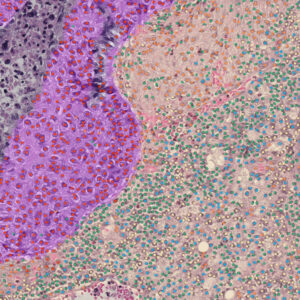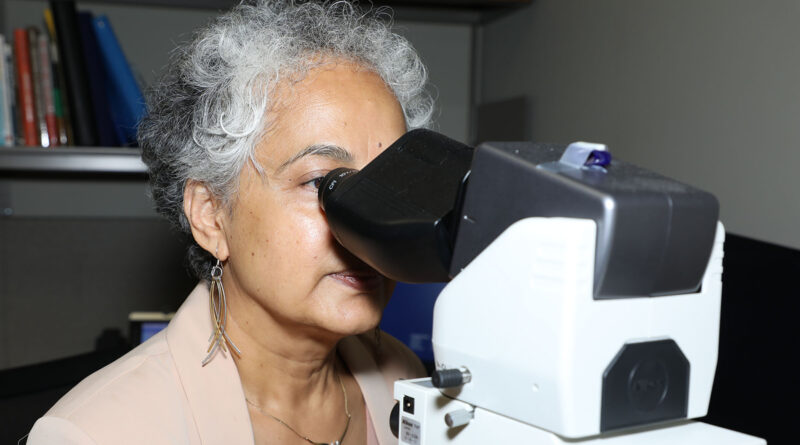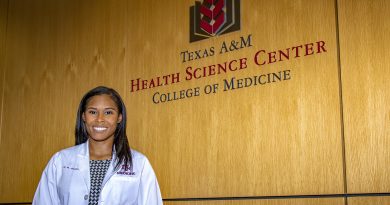Innovative Medicine: Artificial intelligence is ‘here to stay’
Story and photos by BRANDY CRUZ
Movies like “Terminator” and “I, Robot” make people fear that artificial intelligence will one day take over the world, but scientists with Baylor Scott & White Health believe that AI will help doctors, which could mean life or death when it comes to health care.
 “AI is here and it is here to stay,” said Dr. Ari Rao, senior vice president at Baylor Scott & White and chief of pathology with BSW Health specializing in molecular genetic pathology. “I think that we should explore how it can be used to more effectively do many of the things we do today. In health care, and particularly in diagnostic medicine such as pathology, it’s going to enhance the skills of our highly trained pathologists to further refine diagnoses — ultimately improving patient care.”
“AI is here and it is here to stay,” said Dr. Ari Rao, senior vice president at Baylor Scott & White and chief of pathology with BSW Health specializing in molecular genetic pathology. “I think that we should explore how it can be used to more effectively do many of the things we do today. In health care, and particularly in diagnostic medicine such as pathology, it’s going to enhance the skills of our highly trained pathologists to further refine diagnoses — ultimately improving patient care.”
 Rao and Dr. Kenneth Youens, pathologist, clinical informaticist and investigator with Baylor Scott & White Research Institute, are currently testing a program from a company called PathAI, which is designed to help scientists interpret pathology slides faster and more accurately than ever before. Rao explained that every human does things differently and interprets information differently. For example, she said that she can look at a slide of a kidney and say there is 25% inflammation, while Youens may say it is 30% inflamed. By bringing in AI, which could calculate the percentage of inflammation quickly and more accurately, the doctors could diagnose and treat a patient much faster.
Rao and Dr. Kenneth Youens, pathologist, clinical informaticist and investigator with Baylor Scott & White Research Institute, are currently testing a program from a company called PathAI, which is designed to help scientists interpret pathology slides faster and more accurately than ever before. Rao explained that every human does things differently and interprets information differently. For example, she said that she can look at a slide of a kidney and say there is 25% inflammation, while Youens may say it is 30% inflamed. By bringing in AI, which could calculate the percentage of inflammation quickly and more accurately, the doctors could diagnose and treat a patient much faster.
“It uses things we see and some things our human brain cannot see (to help calculate),” Rao explained. “It’s a great tool to help us do the things we do, but better. And we’re guiding it.”
In the past, samples were taken and doctors would have to look at the slides under a microscope. Now, many slides are digitized and interpreted using a computer. Youens explained that, as humans, we’re not perfect. Even the most attentive person can find their attention wandering while trying to perform a monotonous task, allowing room for error. That is where AI comes into play, allowing for even greater accuracy and seeing the bigger picture when it comes to the health of the patient.
“There are types of AI that help us interpret the picture,” Youens added. “It can help us pick up things we wouldn’t see or potentially pick up patterns we wouldn’t have recognized. Part of what we do requires attention.”
Rao and Youens explained that one of the great things about the program is, as they discover things and provide feedback, the AI’s algorithm is adjusted, making it better and better each time.

One of the areas they have been testing it on is lung cancer slides. By using PathAI’s software, they will be able to quickly determine how a patient might respond to certain cancer drug. Youens explained that the program helps scientists sub-classify the cells carefully and determine which treatment plan would be most beneficial to the patient. Rao added that some such programs can even determine if the cancer is likely to return and when it could potentially return.

Inquisitive by nature, Rao said she has always wanted a deeper understanding of the human body, always wanting to know the “Why?” in science. Her curiousness helped her develop one of the first rapid COVID-19 tests in the state of Texas. Rao said she worked with a diagnostic company out of Austin to come up with the test. When COVID-19 first hit the United States in 2020, she said their lab was only running about 10 samples per day. Within days of working with Luminex, they were running more than 2,000 samples per day.
“They came on site here and we discussed how to bring a test online. We worked for 10 days straight and got the test rolling out,” she explained. “I look back on it now with relief. It was chaos, but we got through it.”
Since both Rao and Youens want to help as many people as possible, they look forward to the future, when they can use AI programs to help real patients and quickly make a difference, like Rao did during the pandemic.
“I call myself a physician scientist,” Rao shared. “There’s so much we don’t know about the human body. When we find out each little bit, it helps the next step and it helps people get better, get healthier, get fitter, get less sick. It’s an amazing feeling to see that that little bit makes such a big difference for everybody.”
“I’m working on something I know is meaningful. Never do I wonder if I’m making a difference, I’m convinced that I am,” Youens added. “And my day-to-day work is something I’m really interested in. I’m working with computers, I’m doing biology, so I’m able to combine those interests into something that really helps people, and it feels good.”




Pingback: From the Editor | October & November 2023 | Tex Appeal Magazine